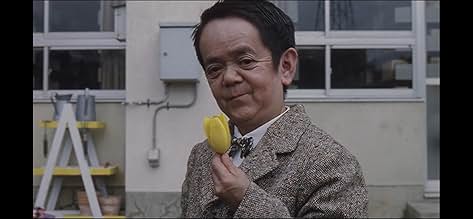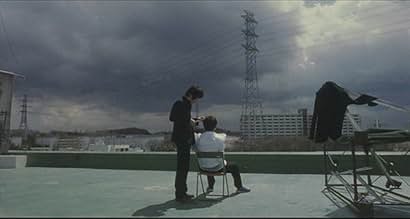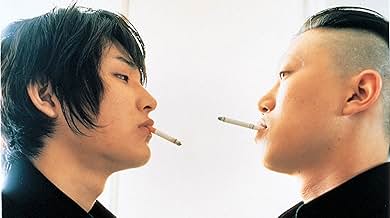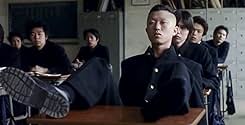AVALIAÇÃO DA IMDb
7,2/10
4,8 mil
SUA AVALIAÇÃO
Um grupo de estudantes decadentes do ensino médio de Tóquio enfrenta as dificuldades de crescer, se distanciar de seus amigos e se preocupar com seu futuro, enquanto vive em um ambiente alta... Ler tudoUm grupo de estudantes decadentes do ensino médio de Tóquio enfrenta as dificuldades de crescer, se distanciar de seus amigos e se preocupar com seu futuro, enquanto vive em um ambiente altamente violento.Um grupo de estudantes decadentes do ensino médio de Tóquio enfrenta as dificuldades de crescer, se distanciar de seus amigos e se preocupar com seu futuro, enquanto vive em um ambiente altamente violento.
- Direção
- Roteiristas
- Artistas
- Prêmios
- 1 vitória e 2 indicações no total
Yûsuke Ôshiba
- Kimura
- (as Yûsuke Ohshiba)
Eita Nagayama
- Obake (Ghost)
- (as Eita)
- Direção
- Roteiristas
- Elenco e equipe completos
- Produção, bilheteria e muito mais no IMDbPro
Avaliações em destaque
With a Soundtrack from 'Thee Michelle Gun Elephant' that most English Indie Producers would kill for, and amazing cast and crew. Aoi Haru draws us into the lives of Japanese teenagers who aren't so lucky in life, who have to make their own destiny from the left over scraps of others who happen to throw them their way.
Aoi Haru is based in a public all boys school called Asahi High.
A extremely miserable place where teachers don't bother to encourage the boys to excel, gang graffiti tags are everywhere marking their turf, and the yakuza's frequently hang around outside the school trying to recruit young members.
The boys learn early on that if you don't fight for what is yours and what you want, then you better keep your mouth shut and stay out of the way. And even though these boys do act tough and dish out violence like a ice cube down the back of your shirt, the boys feel lost and confused due to the fact they cannot understand why they can not make their dreams come true. Almost feeling forced into the violence and self destruction they create because it will be their only real legacy they can leave behind before they enter the real world and pretty much dead end lives.
On the 25th Graduation ceremony at Asahi High a group of the new seniors head up to the Schools roof for a deadly tradition held by the boys who wish to rule the school. A initiation that involves the boys hanging off the side of the building and seeing how many claps they can do before they give up or just fall to their death when they can't grab the rail in time.
And this time Kujo wins the leadership, which does confuse the other boys abit because he is quiet and constantly deep in thought about things but accept it because he won fair and square.
Even though Kujo does seem to be harmless and gentle, when it comes down to it he can be the most violent member of his gang. Though Kujo is the leader of the gang and his Best friend Aoki adores him deeply, Kujo doesn't really want to change anything. He doesn't want to rip the school apart with violence unless he has to. He just feels lost about not knowing what the future holds and what is beyond High School, and constantly asks his friends what they will do after High School because he secretly doesn't know what to do himself. Which annoys Aoki greatly, because he has all of the power and he doesn't want to do anything with it. With this Aoki decides to break off and turn Asahi High into a living hell for everyone who is unlucky enough to get in his way, which in turn rips these Childhood friends apart.
But can they fix their friendship before it's too late?
In the end this Movie really is for all the Gofers, Wanna-bes, Dreamers and lost souls out there. Because everyone can relate to at least one of these characters in Aoi Haru
Aoi Haru is based in a public all boys school called Asahi High.
A extremely miserable place where teachers don't bother to encourage the boys to excel, gang graffiti tags are everywhere marking their turf, and the yakuza's frequently hang around outside the school trying to recruit young members.
The boys learn early on that if you don't fight for what is yours and what you want, then you better keep your mouth shut and stay out of the way. And even though these boys do act tough and dish out violence like a ice cube down the back of your shirt, the boys feel lost and confused due to the fact they cannot understand why they can not make their dreams come true. Almost feeling forced into the violence and self destruction they create because it will be their only real legacy they can leave behind before they enter the real world and pretty much dead end lives.
On the 25th Graduation ceremony at Asahi High a group of the new seniors head up to the Schools roof for a deadly tradition held by the boys who wish to rule the school. A initiation that involves the boys hanging off the side of the building and seeing how many claps they can do before they give up or just fall to their death when they can't grab the rail in time.
And this time Kujo wins the leadership, which does confuse the other boys abit because he is quiet and constantly deep in thought about things but accept it because he won fair and square.
Even though Kujo does seem to be harmless and gentle, when it comes down to it he can be the most violent member of his gang. Though Kujo is the leader of the gang and his Best friend Aoki adores him deeply, Kujo doesn't really want to change anything. He doesn't want to rip the school apart with violence unless he has to. He just feels lost about not knowing what the future holds and what is beyond High School, and constantly asks his friends what they will do after High School because he secretly doesn't know what to do himself. Which annoys Aoki greatly, because he has all of the power and he doesn't want to do anything with it. With this Aoki decides to break off and turn Asahi High into a living hell for everyone who is unlucky enough to get in his way, which in turn rips these Childhood friends apart.
But can they fix their friendship before it's too late?
In the end this Movie really is for all the Gofers, Wanna-bes, Dreamers and lost souls out there. Because everyone can relate to at least one of these characters in Aoi Haru
'Aoi Haru' is a very bleak movie that derives its beauty precisely from the haunting sense of nihilism. The almost ruined school with its dingy rooms and dense graffiti is not just the set to the action, it seems to represent the characters' lack of prospects. A movie that makes something of a pun on the word 'adolescence' (together the kanji for 'ao' and 'haru' read as 'adolescence') cannot help but make considerations about the future but these are without a doubt not promising. The school-ground is a yakuza recruiting ground in the most literal of ways and the initiation into gangs is not so much a temporary revolt from troubled teens as it is a preparation for a life of crime. Dreams are hinted at only to be thoroughly dashed. Violence runs rampant but is handled soberly by a camera that know just how much to show to elicit a reaction.
It is against this background that the main story unfolds: a friendship between two boys gone wrong. Matsuda (Kujo) gives a stunning performance, his cool demeanor matches sociopathic tendencies very well and make him believable as a ruthless and detached young man with little interest even in his own life. The clapping game will have anyone hold their breath and is shot in such a way as to make it even more disturbing. Arai (Hirofumi) is also very competent as the bosom body whose fall out seals his descent into darkness.
A strong soundtrack adds to the impression of things going wrong in an artistic way. Juvenile delinquents or not the human aspect of boys in a sticky situation provides reasons for the viewer to see past the almost intrinsic seediness of it all. Ryuhei cutting Araki's hair as they discuss what to do when they grow up is surprisingly moving and the climax of the movie brings it all home in a painful but excellent way. Apart from these two leads there are minor characters that are equally interesting such as the sickly boy fascinated with worms (that despite being so peaceful frightens Kujo because he has a purpose), a psychopath in the making, the boy that wants to go to Koshien. All people that are adrift without guidelines.
Grownups are not absent but they appear sparingly and only the little person teacher that teaches the boys how to water flowers is a positive influence. The focus is strongly placed on the young actors and they truly do shine.
'Aoi Haru' is realistic despite being a very artistic movie. It should be seen back to back to Miike's 'Crows Zero' that is a take of the same concept in a much more fanciful and less bleak way. But 'Aoi' is brilliant in its own right by adhering so steadily to an ethos of bleakness and loss. Growing is, without a doubt, not easy.
It is against this background that the main story unfolds: a friendship between two boys gone wrong. Matsuda (Kujo) gives a stunning performance, his cool demeanor matches sociopathic tendencies very well and make him believable as a ruthless and detached young man with little interest even in his own life. The clapping game will have anyone hold their breath and is shot in such a way as to make it even more disturbing. Arai (Hirofumi) is also very competent as the bosom body whose fall out seals his descent into darkness.
A strong soundtrack adds to the impression of things going wrong in an artistic way. Juvenile delinquents or not the human aspect of boys in a sticky situation provides reasons for the viewer to see past the almost intrinsic seediness of it all. Ryuhei cutting Araki's hair as they discuss what to do when they grow up is surprisingly moving and the climax of the movie brings it all home in a painful but excellent way. Apart from these two leads there are minor characters that are equally interesting such as the sickly boy fascinated with worms (that despite being so peaceful frightens Kujo because he has a purpose), a psychopath in the making, the boy that wants to go to Koshien. All people that are adrift without guidelines.
Grownups are not absent but they appear sparingly and only the little person teacher that teaches the boys how to water flowers is a positive influence. The focus is strongly placed on the young actors and they truly do shine.
'Aoi Haru' is realistic despite being a very artistic movie. It should be seen back to back to Miike's 'Crows Zero' that is a take of the same concept in a much more fanciful and less bleak way. But 'Aoi' is brilliant in its own right by adhering so steadily to an ethos of bleakness and loss. Growing is, without a doubt, not easy.
I'm told the title Aoi Haru can be read two ways: "blue spring" or "teenage years". Anyway, I liked this movie. What I liked were the dark aspects of this movie and the attempts at symbolism. What I didn't like was the somewhat aimlessness of the plot and the attempts at symbolism. I find it a lot like "go" which also has Hirofumi Arai (Aoki). Both violent highschool movies. Some people have compared it to Battle Royale... although I think this has a better basis in reality. Someone mentioned this movie was strung together from several short manga stories, which makes sense, since we tend to jump through several character's story lines. It isn't necessarily a bad thing, as we get to see where each character is coming from and where they end up. The variety is nice but it I felt like the movie lost it's focus at points. Overall, though, I felt it draws the viewer in and manages to stay kinetic throughout. There was rarely a boring moment. Even a girl waiting for her boyfriend ended up being very amusing. The movie is rather violent and disturbing at points, but managed to still be funny and introspective. I'd probably recommend it to people who can still remember what highschool was like.
The closing night movie for the SF Indie Fest is a vaguely coming of age type drama, set entirely within the grounds of a Japanese boy's school. Here, the kids all run around in gangs, sleep in lectures and fight at break times. Every wall in the place is covered in graffiti. Ryuhei Matsuda (the effeminate guy from GOHATTO) stars as Kuja, a senior who becomes the school's official gang leader by winning at "The Clapping Game". This game involves the kids hanging from a railing on the edge of the school roof, letting go and seeing how many times they can clap their hands before their nerve fails and they grab back on.
From here we follow the progress of his friends and enemies throughout a part of the school year, the challenges to his leadership and the pressure of the school system felt by everyone. There's a hell of a lot of violence goes on in the school, and we get the impression that life as a Japanese school boy is a difficult dangerous business.
It's a pretty bleak and cheerless vision - between this and BATTLE ROYALE you'd be forgiven for thinking that the Japanese school system was on the point of explosion or collapse, with the youth as disaffected as they come. How close this is to reality I don't know, but the friend I saw it with tells me that the classroom scenes are pretty close to how it actually is.
The cast all perform well - Ryuhei Matsuda has such a striking appearance that he doesn't really need to do anything to create an impression, and indeed he spends most of the movie being aloof and impenetrable. This contrasts with the energies and frustrations evident in the other characters, particulary his best friend Aoki.
I enjoyed the movie a lot... good characters, and well filmed/scored, with interesting developments. It's based on a collection of autobiographical short stories from a manga artist, which shows a little bit in the episodic nature of the plot, but it's all weaved together well for the movie. Worth looking out for if you don't mind your high school movies nihilistic, violent and bleak.
From here we follow the progress of his friends and enemies throughout a part of the school year, the challenges to his leadership and the pressure of the school system felt by everyone. There's a hell of a lot of violence goes on in the school, and we get the impression that life as a Japanese school boy is a difficult dangerous business.
It's a pretty bleak and cheerless vision - between this and BATTLE ROYALE you'd be forgiven for thinking that the Japanese school system was on the point of explosion or collapse, with the youth as disaffected as they come. How close this is to reality I don't know, but the friend I saw it with tells me that the classroom scenes are pretty close to how it actually is.
The cast all perform well - Ryuhei Matsuda has such a striking appearance that he doesn't really need to do anything to create an impression, and indeed he spends most of the movie being aloof and impenetrable. This contrasts with the energies and frustrations evident in the other characters, particulary his best friend Aoki.
I enjoyed the movie a lot... good characters, and well filmed/scored, with interesting developments. It's based on a collection of autobiographical short stories from a manga artist, which shows a little bit in the episodic nature of the plot, but it's all weaved together well for the movie. Worth looking out for if you don't mind your high school movies nihilistic, violent and bleak.
I think it captured the high school feeling of despair better than any other movie. The high school movies I am used to usually transform everything into a battle between characters where in the end the good guy wins. Or maybe he loses. But what if you don't want a battle? What if you just don't know what to do or you just don't care?
In Aoi Haru a deadly game decides who the leader of the school will be. A lonely quiet guy wins the game, but he does it only because he doesn't care enough to fear for his life. He actually does it for the game, not for the leadership. That annoys the hell out of his friend, ex boss himself, who can't understand someone that does not want to abuse his power. In the end their friendship is brutally ended.
There are some interesting metaphors in there, like the flowers that the boys are trying to grow, even if just one of them lives to see them blossom. It is also interesting that it is a boys only high school, maybe that's the norm in Japan, I don't know.
There is also in the movie the hidden message that neglect and inaction can do more damage than acting badly. I am talking here about the teachers in the film, that are just dictating machines with no will to educate or care. I mean, doctors can be accused of malpraxis. Lawyers, too. Yet teachers, who are supposed to create social beings from adolescents, are not held responsible for their mistakes.
Enough babble. This is a good film, maybe a bit long, but it does need almost every scene. The soundtrack is also very nice and fits the plot. It is worth watching.
In Aoi Haru a deadly game decides who the leader of the school will be. A lonely quiet guy wins the game, but he does it only because he doesn't care enough to fear for his life. He actually does it for the game, not for the leadership. That annoys the hell out of his friend, ex boss himself, who can't understand someone that does not want to abuse his power. In the end their friendship is brutally ended.
There are some interesting metaphors in there, like the flowers that the boys are trying to grow, even if just one of them lives to see them blossom. It is also interesting that it is a boys only high school, maybe that's the norm in Japan, I don't know.
There is also in the movie the hidden message that neglect and inaction can do more damage than acting badly. I am talking here about the teachers in the film, that are just dictating machines with no will to educate or care. I mean, doctors can be accused of malpraxis. Lawyers, too. Yet teachers, who are supposed to create social beings from adolescents, are not held responsible for their mistakes.
Enough babble. This is a good film, maybe a bit long, but it does need almost every scene. The soundtrack is also very nice and fits the plot. It is worth watching.
Você sabia?
- CuriosidadesIn the scene where Kimura gives his blazer to the baseball club freshman before climbing over the fence to join the Yakuza, there is Japanese writing embroidered on the jacket lining. This is the same poem that Kimura reads out in voiceover during the subsequent shots of him getting in the car.
- ConexõesVersion of Revolver - Aoi haru (2003)
- Trilhas sonorasDrop
Performed by Thee Michelle Gun Elephant
Principais escolhas
Faça login para avaliar e ver a lista de recomendações personalizadas
- How long is Blue Spring?Fornecido pela Alexa
Detalhes
Bilheteria
- Orçamento
- US$ 800.000 (estimativa)
- Tempo de duração
- 1 h 23 min(83 min)
- Cor
- Proporção
- 1.85 : 1
Contribua para esta página
Sugerir uma alteração ou adicionar conteúdo ausente






















